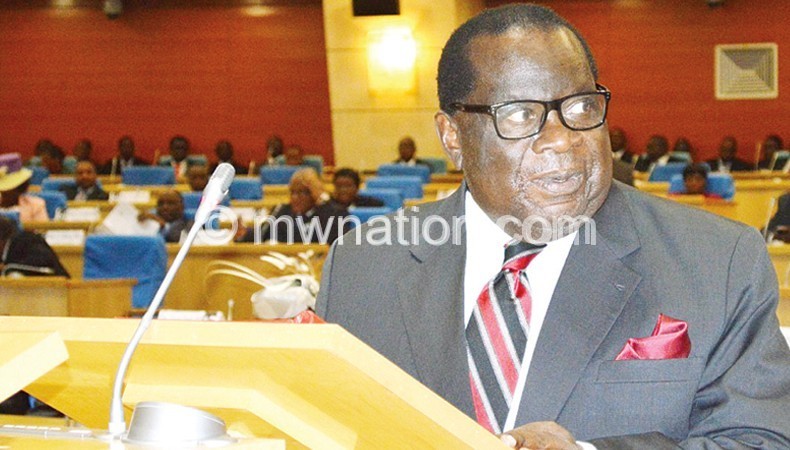BUDGET BLUES: Goodall misses Parley as key budget report is tabled

National Budget in Parliament
The keeper of Malawi’s purse may not have been in the House when the most comprehensive and influential response to the budget statement was tabled in Parliament yesterday.
But wherever he is, Finance Minister Goodall Gondwe may have felt the heat at the news that the Budget and Finance Committee of Parliament put him on the ‘truth-meter’, subtly discrediting some of his triple digit allocation hike claims to some agencies even as they demanded expenditure increases the minister cannot afford.
Tabling its comprehensive report comprising input from parliamentary clusters by sector, the committee told the absent Gondwe to revise allocations to key sectors such as health and governance institutions to enable them to at least operate optimally.
The proposed hikes—if adopted—could further bloat the K742 billion (US$1 800 970 874) budget, which Gondwe says does not contain the expected K43 billion (US$104 368 932) from donors as budgetary support.
Donors are indefinitely clinging to most of their budgetary support—which traditionally cumulatively makes up roughly 40 percent of total expenditure—on the back of Cashgate.
The fiscal plan is also buckling under a K107 billion (US$259 708 738) deficit, one of the largest in years, which Treasury expects to raise by borrowing from the domestic market—an option that may be inflationary, potentially raise interest rates and crowd out the private sector.
Gondwe also hopes to balance his yawning budget with foreign loans; a sure way of increasing foreign debts.
In the committee report, which the whole House adopted, chairperson Rhino Chiphiko said the committee noted the need to increase allocations to the Malawi Police Service (MPS), which has increased by a mere 3.2 percent or K400 million from K12.4 billion to K12.8 billion and the Ministry of Education, Science and Technology, specifically to cater for teaching and learning materials and recruitment of 21 000 qualified teachers.
The committee also wants more allocations to schools, which it noted could not manage to pay utility bills due to low funding.
In the budget, according to the committee, allocation to the Anti-Corruption Bureau (ACB) has been put at K1.42 billion compared to the revised figure of K1.41 billion in the 2013/14 National Budget, a rise of less than one percent.
This is in sharp contrast to Gondwe’s proclamation that funding to ACB had gone up by 167 percent.
The minister also said that “law enforcement votes have been granted a more than usual expenditure increase that averages at more than 80 percent” so that “we should get at the bottom of what really happened as regards the ‘Cashgate’ scam.”
The votes in question included the Director of Public Prosecutions, the Judiciary, the police and others that “have also had large increments for the same reason”.
The committee has also described the Farm Input Subsidy Programme (Fisp) as a misallocation whose K55.8 billion could have been allocated to other priority programmes in the agriculture sector. It recommended gradual phase out of Fisp.
Reads the committee report: “Fisp should not overshadow the priority programmes of the Ministry of Agriculture such as those that are promoting farmers who are contributing to the economy of the country.”
The drug budget of the Ministry of Health attracted the most attention from the committee, which bemoaned the failure to meet the 15 percent of the total budget recommendation as per international standards.
The committee also warned government against expecting donors to foot the K5 billion arrears that the Ministry of Health has incurred.
The committee also noted budget cuts to procurement of medical equipment from the required K4 billion to K3.1 billion, allocation of K8.3 billion for drugs for district and central hospitals instead of required K33.3 billion, and that the reproductive health budget needed an increase from K26 million to K60 million.
Further, the committee lobbied for an increase in the allocation to the National Assembly, which they said has a K1.7 billion deficit.
The committee also made an appeal for a budget line for the new Office of Directorate of Public Assets Declaration, which is currently attached to the National Assembly.
In his remarks after the House adopted the report, Chiphiko asked government to be prudent in its resource allocation.





